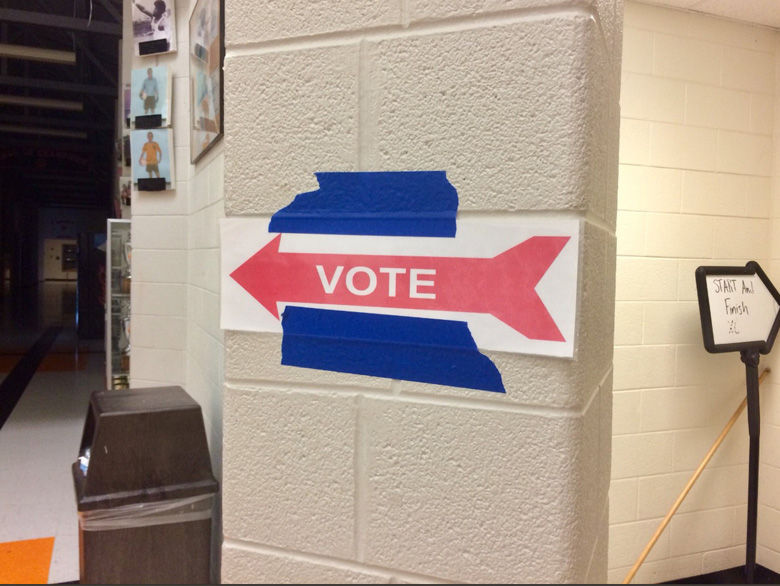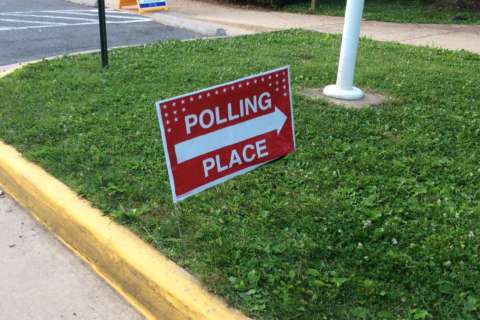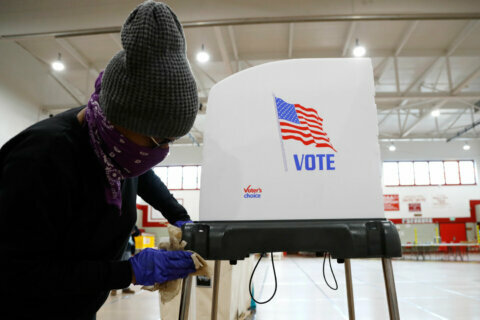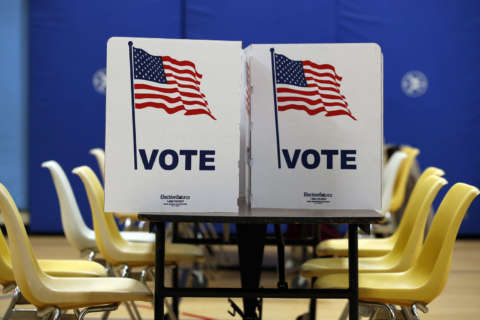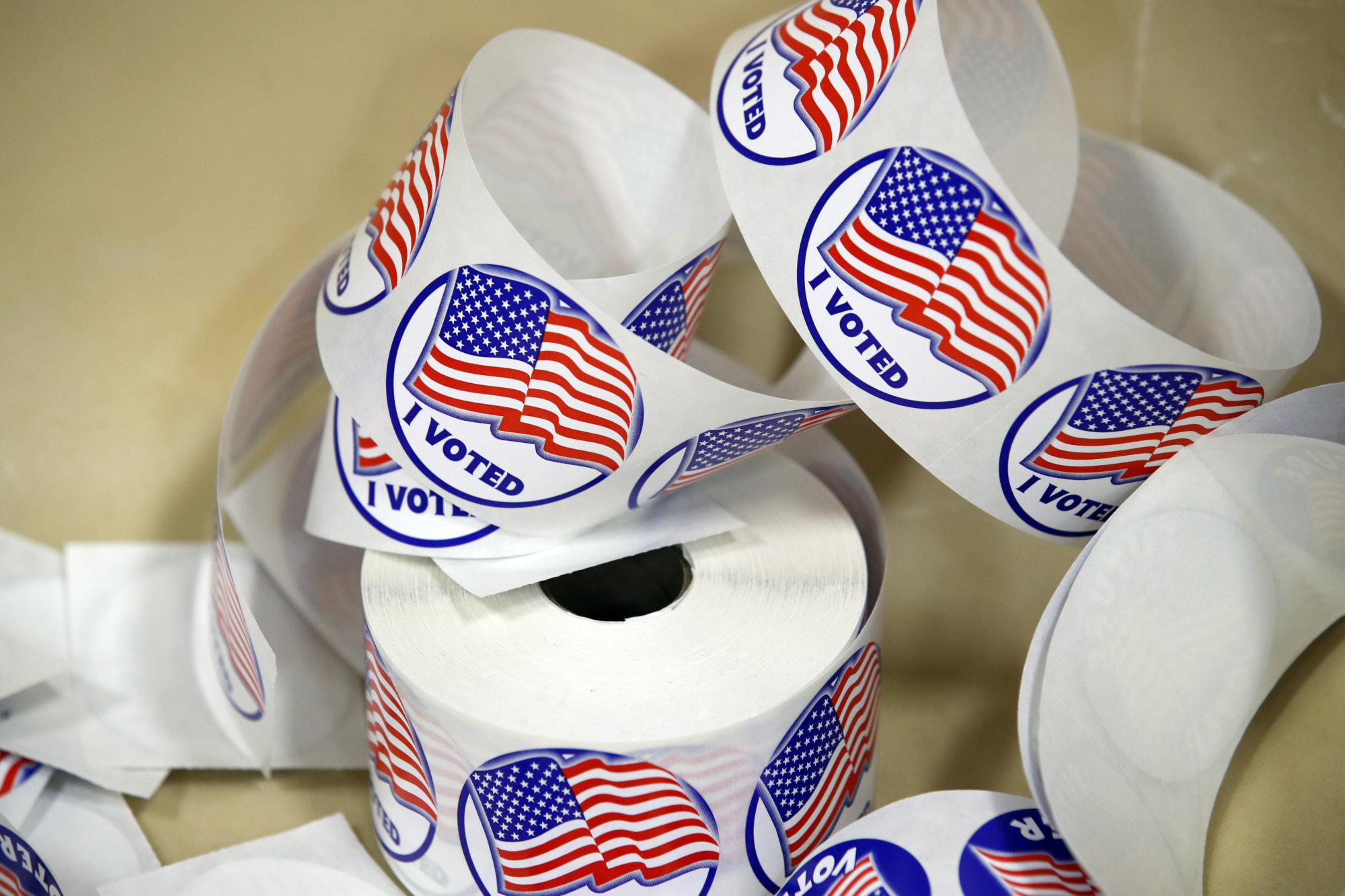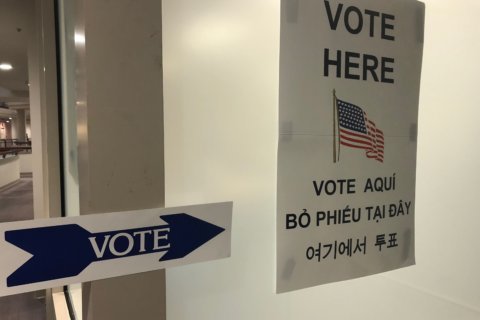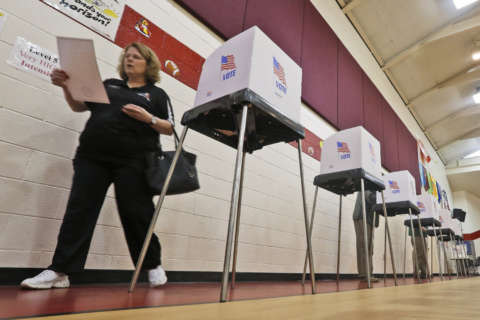Editor’s note: This is one in a series of pieces on Virginia’s June 12 primaries. WTOP interviewed all candidates in contested local races. See all of WTOP’s primary coverage on our Elections and Politics page.
WASHINGTON — Virginia’s 10th Congressional District is a top target for the national Democrats this fall, and the June 12 primary features six candidates vying for the party’s nomination who may have narrower differences on policy than in their experiences and backgrounds.
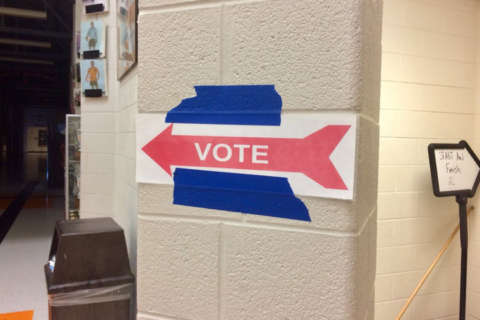
Each of the six candidates in the district, which runs from the West Virginia line through Winchester, Loudoun County and parts of Prince William along the Potomac River into Fairfax County, expects to take on Rep. Barbara Comstock in November’s general election. She first faces her own primary June 12.
The Democratic candidates
The candidates, in the order they appear on the ballot, are Lindsey Davis Stover, state Sen. Jennifer Wexton, Paul Pelletier, Alison Friedman, Dan Helmer and Julia Biggins.
Davis Stover and Friedman each worked in the Obama administration — Davis Stover on veterans’ policy and Friedman in the State Department, largely on anti-human trafficking issues. Pelletier, like Wexton, is a former prosecutor, and is campaigning as more of a moderate. Helmer is an Army veteran; Biggins, an infectious disease scientist.
Wexton is the only candidate who has held elected office. She touts her record in the General Assembly as giving her a unique perspective, and has secured the endorsement in March of Gov. Ralph Northam.
“Not only have I run and won two competitive races in the district; I’ve showed that I can work across the aisle once I get there, and achieve positive results for my constituents,” Wexton said.
Friedman has outraised the others in the field, with Wexton, Helmer and Davis Stover reporting enough cash on hand to thoroughly compete in the district. Pelletier raised about half as much as Wexton, Helmer and Davis Stover, while Biggins had raised much less, as of the most recent campaign finance reports — around $110,000 over the course of the campaign.
In the crowded field, some of the candidates with less built-in name recognition have attempted to draw attention to themselves in ways beyond simply paying for advertising.
Helmer, for example, recently ran an ad comparing the threat posed by Osama bin Laden before Sept. 11, 2001, to what the ad described as the threat President Donald Trump poses to American democracy today. Earlier, he had posted a campaign video of himself buying a semi-automatic rifle at a gun show, saying it was meant to show how easy it is to get one.
All of the candidates, though, say they strongly oppose Trump and support background checks for all gun sales, including those by private sellers.
“We’ve allowed the NRA to falsely frame this debate as if there is only a binary choice — either take everyone’s guns away or any gun any time no matter what, no questions asked,” Friedman said. “A whole range of common sense options that both respect responsible gun owner’s rights but also keep all of us safer are on offer right now, and we’re not even having that conversation.”
Each candidate is confident he or she can win, both in June and in November.
Top issues
Health care and guns are among the top issues for most of the Democratic candidates.
“This administration, at every turn, has looked to undermine health care in this country, including [in] the passage of the last tax bill,” Davis Stover said.
She would also prioritize education by increasing funding to provide not only universal kindergarten, but also universal pre-K programs.
Davis Stover suggests maintaining college grants and loan programs, and expanding public service loan repayment programs to a new national service program providing tuition assistance in exchange for a year or two of military, the Peace Corps, Teach for America, AmeriCorps or similar public service. She said she would not have been able to go to college without a combination of funding sources.
“It shouldn’t be that hard to send our kids to college,” she said.
Biggins, the infectious disease scientist, said single-payer health care, education and the environment are her top issues.
“I am the only candidate in this race that will fight for the single-payer health care program,” she said, praising a plan from Vermont Sen. Bernie Sanders.
She said the position could work to win an election, even in a district that tends to vote Republican.
“I think most people want to have a secure source of health care, and they want to be covered regardless of pre-existing conditions and have all manner of health-related issues covered like mental health and vision and dental, and I think a single-payer system, once they understand it a little bit better, will resonate with quite a few people,” she said.
On education, Biggins wants federal money to balance out public school funding across richer and poorer areas by increasing taxes on wealthier people. She would also like to start a pilot program that would provide free or reduced tuition to community colleges in exchange for some type of national service. If it worked, the program could then expand to cover four-year degrees.
Helmer, the Army veteran who moved on to work in the private sector, highlighted gun policy and his support for a “Medicare for all” health care option as his top issues, along with the need for transportation funding, including additional federal money for Metro.
“I’m ready to fight the gun lobby and the NRA, because it is ridiculous that three times a year, my wife Karen and teachers like her have to huddle with their kids in the corner of the classroom to prepare for an active shooter, and I am ready to say enough is enough and fight for responsible gun laws,” Helmer said.
Pelletier, the former federal prosecutor, said driving down the cost of health care by fixing the existing Affordable Care Act, taking guns off the street, and standing up to power are his top issues.
“At this point in time, to talk about universal health care is irresponsible because people need health care today, and I don’t think that, even though universal health care is sort of the gold standard where we ought to be, it’s not going to happen tomorrow; it’s going to cost about $4 trillion a year, the same thing with the Medicare option. That’s going to cost about $1.4 trillion,” he said.
“There’s real things we could do today and tomorrow to start providing health care to people tomorrow and not striving to do something that’s going to cost trillions and trillions of dollars and that Congress is going to fight about,” he added.
Wexton, who just joined Virginia Senate colleagues to pass a budget that expanded Medicaid in the state, said guns and health care were the two most important issues in the race.
“I have experience working across the aisle and getting things done in both of those areas,” she said.
“I am the candidate in this race who has already been serving in the district; I’ve had a strong record of bipartisan legislation that I’ve managed to pass, things that help kids and families in the district, and that’s the same thing I’ll do in Congress,” Wexton said.
She would also like to see more funding for public schools, steps to address college costs, and additional consumer protection standards for for-profit colleges.
Accountability and President Trump
Opposing Trump or ensuring accountability in government came up in interviews with all six candidates, and drove many of their decisions to run for Congress.
Friedman said she made the decision to run after her 8-year-old daughter completed an optional homework assignment to write a letter to the president about kindness.
“When I went to take a picture of it, she told me I couldn’t because what if the president finds out she wrote it and brings his guns to our house? I believe if she could write that letter believing it endangered herself, I can do more,” Friedman said.
She said her experience in national security and human rights puts her in a position to take on Rep. Comstock on economic and other issues in November.
“I believe the federal government is responsible for providing security and opportunity for its people and that it can’t do that well unless it’s operating with integrity, and I would argue on all three measures we’re failing right now,” Friedman said.
Wexton said her experience winning in the district and working as a member of the Democratic minority in the state Senate put her in the best position to win.
“I am truly worried about how much damage Donald Trump and congressional Republicans who are enabling him are going to be able to do to our country in the next couple years,” Wexton said.
“I am able to work across the aisle by focusing on things that help kids and families and things that are kitchen table issues that cross party lines,” she said.
She points to votes on the opioid crisis, transportation funding and child safety, among others.
“Donald Trump’s election has caused a lot of people to recognize that they can’t just sit on the sidelines and hope for the best. They need to act and they need to engage,” Wexton said.
Biggins emphasizes to voters that she is a scientist.
“The attack on science by the Trump administration was one of the first signals to me that something was going wrong in this county … so, it’s definitely a big part of my campaign,” she said.
“In addition to the science background, [voters are] excited to know that smart people are running for office, because we feel like there’s definitely a lack of that right now,” Biggins said.
Pelletier points to his work as a prosecutor.
“I have a career of standing up to power, and corrupt power in particular and making a difference,” he said.
“[Voters are] sick and tired of a government that isn’t working for them. When I say a government, I mean an administration and a Republican Congress,” Pelletier said.
“As a moderate, problem-solving and pragmatic candidate, I can win over the independent and moderate votes that some of the other candidates cannot win over,” he said.
Davis Stover believes her experience as a chief of staff on Capitol Hill and her work on veterans’ issues in the Obama administration sets her up to be most effective right from the start of a two-year term.
“At a time when we need a strong Congress and a strong check on this administration, I’ll be able to hit the ground running on day one,” she said. “Unfortunately, in this administration, we’re going to have to do a lot of blocking and tackling to protect what we have.”
After a career on the policy side of government, and a life in which she said government has worked for her when she needed help, the 2016 election spurred her to run, too.
“After the election, and Donald Trump was elected … I think we all found ourselves doing things we never thought in a million years we’d do,” she said.
Helmer goes further, saying he is running for office to defend the country and protect the future.
“President Trump is unfit for the office in which he serves, and he is the example of what happens when we have people who put their own selfish interests ahead of the interests of their country,” Helmer said. “We need to make sure we have a Congress that will hold this president accountable, that our agencies are doing the job which Congress has set forth for them, and that we are leading by example in the world.”
Friedman worries that the thousands of federal workers across the 10th District may feel helpless.
“They’re watching their expertise, experience and basic facts be written off as irrelevant every day,” she said.
“Abuses of power and big intractable problems is how voters in VA-10 would describe Congress right now. I think my understanding of both how the federal government works and doesn’t work and the grave stakes right now in the direction of our country, both for our place in the world but also for our constitution and especially Northern Virginians and people in the Shenandoah Valley, really matters for where we’re headed going forward,” Friedman said.
Transportation
The candidates largely agree that the federal government should do more to help fund and support the Metro system, and they have varying other ideas for transportation improvements, which are a top concern among voters.
“Dealing with WMATA and Metro is certainly one of the top issues for the federal government, because that requires the federal government to work alongside Virginia, Maryland and D.C. to find solutions,” Wexton said.
She sees transportation, economic and educational issues as some of those that unite the district, while access to broadband in the west and focused development and growth to the east create differing concerns.
Helmer would like to see the federal government contribute $500 million per year to the Metro system, since so many federal workers use it.
He would also like to see federal money for Interstate 81 improvements, and higher density housing near Metro to reduce the number of people on the roads.
Friedman finds some of the traffic delays “nonsensical,” and would like to see more midday commuter buses so long-distance commuters would not feel stuck inside the Beltway if they needed to get home early.
She would also like to make telework more accessible to the large federal workforce across the district, since, she said, there is a difference between having a telework option and really being able to do it on a regular basis.
Biggins links transportation fixes to her environmental concerns and is hopeful that high-speed rail could expand across the country, including providing expanded commuter service in Northern Virginia.
“That will help not only in infrastructure, but jobs and the environment and getting cars off the streets,” she said.
Locally, she would like to see better bus systems and other transit to help reduce traffic jams.

